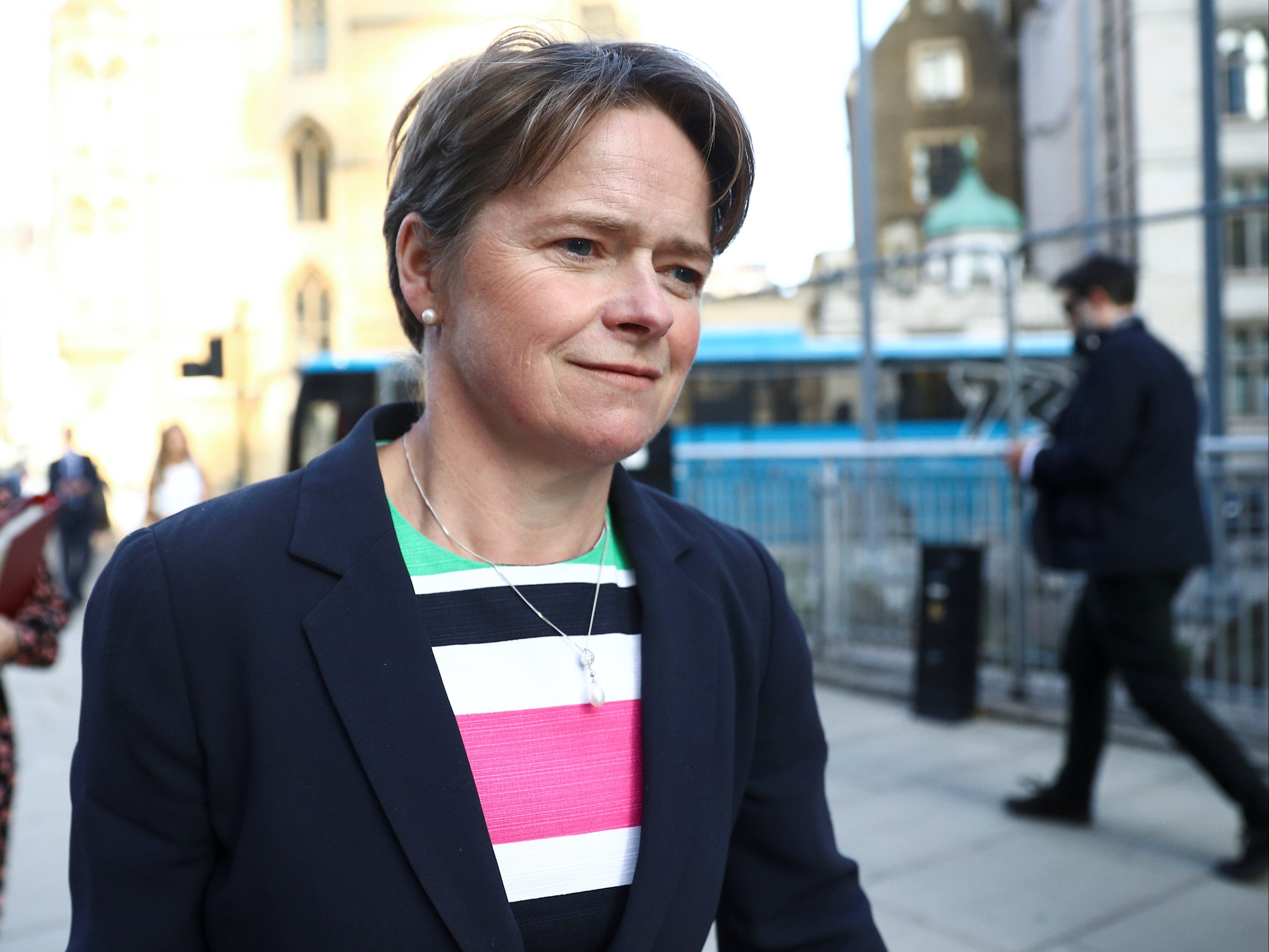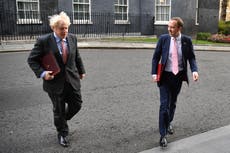Is the government really guilty of wasting billions on consultants and outsourcing companies?
Some see an ‘ideological obsession’ on the part of ministers and their advisors with using the private sector, rather than the public sector to deal with the virus. Others allege outright corruption. So what’s the reality? Is the situation really as rotten as is being claimed? Ben Chu investigates


The outsourcing company Serco announced on Friday that its profits are going to be considerably higher than previously expected because of its receipt of government contracts to help run the coronavirus test and trace programme.
We also learned this week that the government earlier this year paid £10m to management consultants to work on the system, with some charging day rates of up to £7,000.
There’s also deep concern about the lack of transparency over the award of these and other procurement contracts related to the coronavirus emergency that have been awarded to the private sector. A cross-party group of MPs working with the Good Law Project have launched legal action against the government for its failure disclose details of coronavirus-related contracts.
Some see an “ideological obsession” on the part of ministers and their advisors with using the private sector, rather than the public sector to deal with the virus. Some suspect cronyism. Others allege outright corruption.
So what’s the reality? Is the situation really as rotten as is being claimed? Or should the government be cut some slack given the unprecedented nature of this health crisis?
First, let’s start with the numbers. There has certainly been an unprecedented explosion of public spending in recent months as the government has scrambled to get to grips with the pandemic. The Treasury this summer earmarked £15bn this year for the purchase of personal protective equipment (PPE), and it announced last month that £12bn this year will go to funding the Test and Trace system.
These are without doubt extraordinarily large sums. It’s also clear that huge chunks of it are heading to private sector players such as procurers, consultants and outsourcing companies. They are buying PPE, running public testing centres, founding new laboratories, building IT platforms, setting up call centres and a host of other activities.
Tussell, a research group that monitors public contracts, estimates that since February the government has awarded 1,997 private sector contracts, with a total value of around £12bn.
But should that money be going to the public sector, rather than the private sector, as some urge? Deenan Pillay, a professor of virology at University College London, argues the government seems to have an “obsession with outsourcing” and has suggested that instead of spending billions on establishing a network of private “Lighthouse” laboratories to process coronavirus samples, the money should have been spent on building up the capacity of public or university labs instead.
Similarly, on the test and trace infrastructure, many argue that it would have been more efficient to build up the public sector capacity, in particular by using local councils’ teams.
The supposed advantage of drafting in the private sector to run these projects is that they have special expertise and are able to bring a considerable amount of staffing quickly. Yet their performance of private sector tracing teams has often been worse than local public health protection ones in reaching contacts of the infected.
Experts say this edge could be due to local teams calling from a local number, and thus being more likely to be picked up by the contact. It might also have helped that local teams know the area or are better able to communicate with people who have English as a second language than national teams.
“Would it not have been more sensible to build on the existing expertise and capacity particularly when it comes to tracing?” asks Nick Davies of the Institute for Government. “You could have built up the local public health teams…For me that would have been the route I would have gone down”.
And what about those management consultants? Work by the Guardian and Open Democracy suggests that Whitehall departments have spent more than £56m on consultants including firms such as McKinsey, Deloitte and PwC. This is not only causing consternation among the public given the high cost, but also within the Government.
A leaked letter from Lord Agnew, the Cabinet Office and Treasury minister, showed that he had asked senior civil servants rein in their use of consultants and stop “depriving our brightest [public servants] of opportunities to work on some of the most challenging, fulfilling and crunchy issues”.
Francis Maude, the former Conservative Cabinet Office minister under David Cameron, agreed this week and said under this government “there has been a tendency to use consultants far too readily”.
Another question is whether civil servants have the expertise to draft and manage these big contracts with outsourcers. The health minister Helen Whately this week revealed that there were no penalty clauses inserted into the test and trace contracts for outsourcers written by the government. She justified this by claiming that “contractual penalties are often unenforceable under English law”. Some legal experts found this unconvincing.
On PPE procurement there would always, at least in the immediate term, be a requirement to use private sector producers and middlemen given that the government was never in a position to start manufacturing it from scratch. But there have been a spate of revelations about firms who provided unusable equipment.
It’s possible that a degree of waste was inevitable given the speed with which officials had to act and the scale of the emergency.
“At the beginning of the crisis when we needed things urgently and there was a mad global scramble for limited supplies there is a stronger case for not going through the normal competitive process, paying slightly over the odds, recognising that some pop up suppliers might know a factory in China [which has PPE supplies],” says Nick Davies of the IfG.
But while a lack of competitive tendering has been justified by the urgency of the situation – and this is permitted under the 2015 Public Contracts Regulations – experts say this is becoming far less valid as the months have passed.
“We’ve been in the pandemic for seven or eight months now so the urgency and get out clauses can only apply for a certain amount of time,” says Peter Smith, an independent procurement expert and author of Bad Buying.
The lack of competitive tendering has also opened the Government up to allegations of cronyism. The Financial Times revealed this week that the department of health awarded a £280,000 consulting contract to the family business of Debbie White, a former boss of the bust outsourcer Interserve and someone who had been involved in running coronavirus testing centres.
In another instance, Public First, a public relations firm, was awarded a contract by the Cabinet Office, without competitive tender, worth £840,000 for running focus groups. The firm is run by close associates of Dominic Cummings and Michael Gove.
“It’s probably not brown paper envelopes stuffed full of money, it’s nepotism and ‘who you know’,” suggests Peter Smith.
The appointment of Dido Harding, a Conservative peer, to run the test and trace system and also the forthcoming successor institution to Public Health England, has been labelled as cronyism, especially given her background is in telecoms, not public health. It didn’t help that Baroness Harding refused to stop taking the Conservative whip in the House of Lords.
Whether this all amounts to corruption or not, the government has certainly not helped itself by the lack of transparency. Many contract documents have still not been published, despite promises they would be and despite the law stating that they must be posted within 30 days. And some of those that have been published are heavily redacted to conceal information.
“There’s very, very little justification for that," says the IfG’s Nick Davies. "Just publish the contract award notice – it’s not difficult. It’s much harder to defend the government if they won’t be transparent about what they’re doing.”
The procurement expert Peter Smith says we should be concerned about the path the government is on.
“The worry that I have is that ministers have enjoyed the fact they haven’t had to go through tedious procurement processes and they think that, with us leaving the European Union, let’s forget all about the rules and regulations, that procurement should be about being able to move quickly and then [they think] we’ll get into support for British companies,” he says.
“If you look at how nationalistic based procurement has worked around the world – it’s almost always either a cover for existing corruption or it leads to more corruption”.




Join our commenting forum
Join thought-provoking conversations, follow other Independent readers and see their replies
Comments